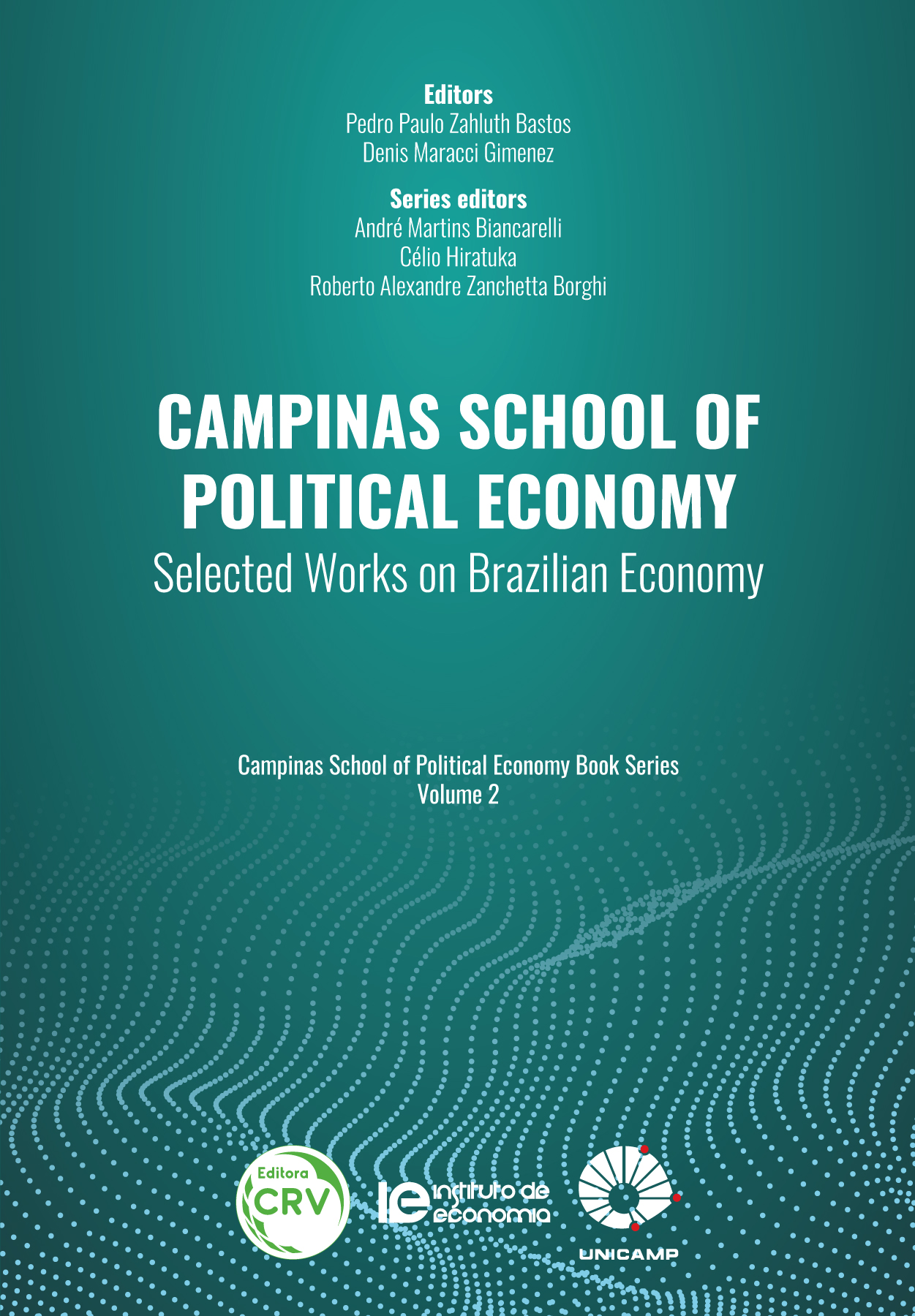PEDRO PAULO ZAHLUTH BASTOS
He holds a Bachelor’s and a Ph.D. in Economic Sciences and a Master’s degree in Political Science from Unicamp. He was president of the Brazilian Association of Researchers in Economic History (ABPHE, 2009-2011), and head of the Department of Politics and Economic History at Unicamp (2008-2012). He was a visiting professor at the University of California, Berkeley (2017-8). Since 2002, he has taught Economics at Unicamp, where he is currently Associate Professor and coordinator of the Center for Conjuncture and Economic Policy Studies (Cecon).
DENIS MARACCI GIMENEZ
Professor at the Institute of Economics of the University of Campinas, with a Ph.D. in Economic Development. He works at IE-Unicamp in the research area of “Development, labor and social structure”. He was director of CESIT/IE/UNICAMP and coordinator of the Economic Sciences course at Unicamp. He teaches undergraduate and graduate courses in the areas of economic development, political economy, labor, and social policy.
JOÃO MANUEL CARDOSO DE MELLO
He graduated in Law and, still as a student, began a course in Social Sciences at USP. After graduating, he took the BNDE-CEPAL course. He worked at Banco Mercantil de São Paulo, from where he left at the invitation of Professor Zeferino Vaz to be a professor at the recently created Unicamp, where he was the founder of the Philosophy and Human Sciences Institute. At Unicamp, in 1975, he defended the thesis “Late Capitalism”, which became a book with the same title. He was technical advisor to the Secretary of Economy and Planning of the State of São Paulo and Acting Minister of the Ministry of Finance. He founded Facamp (Faculdades de Campinas).
FERNANDO ANTONIO NOVAIS
Professor Emeritus of the University of São Paulo (USP), where he taught in the Department of History of the FFLCH between 1961 and 1986 in the chair of Modern and Contemporary History. Professor at the University of Campinas (UNICAMP), where he taught at the Institute of Economics between 1986 and 2003. He holds a Ph.D. in History from the University of São Paulo (1973) and he is the author of the book “Portugal e Brasil na Crise do Antigo Sistema Colonial”, a classic work of Brazilian historiography, as well as several important works on history and historiography.
MARIA DA CONCEIÇÃO TAVARES
She holds a degree in Mathematics from the University of Lisbon (1953), a degree in Economics from the Federal University of Rio de Janeiro (1960), a specialization from ECLAC (1960), a Master’s degree from University of Paris II (1972), and a Ph.D. in Industrial and Technological Economics from the Federal University of Rio de Janeiro (1975). She was a Professor at theInstitute of Economics at the University of Campinas, and currently she is an Emeritus Professor at the Federal University of Rio de Janeiro. She was also a Representative in the Lower Chamber in Brazil (1995-1998). She has experience in the field of Economics, with an emphasis on Economic Theory and Political Economy, areas in which she published many influential books and papers.
LUIZ GONZAGA DE MELLO BELLUZZO
He graduated in Law from the University of São Paulo (USP) in 1965, and studied Social Sciences at the Faculty of Philosophy, Languages and Literature, and Human Sciences at USP. He joined the Graduate Program in Economic Development, promoted by ECLAC /ILPES and graduated in 1969. He was a professor at the University of Campinas, where he earned his doctorate in 1975 and became a Full Professor in 1986. Between 1974 and 1992, he was an economic advisor, and secretary of Economic Policy of the Ministry of Finance (1985-1987), during the government of José Sarney. From 1988 to 1990, he was Secretary of Science and Technology of the state of São Paulo, during the administration of the late former governor Orestes Quércia. In 2001, he was included in the Biographical Dictionary of Dissenting Economists among the 100 greatest heterodox economists of the 20th century. He received the Intellectual of the Year Award (Juca Pato Award), in 2005. He was a personal economics consultant to President Luiz Inácio Lula da Silva. He is considered one of the best heterodox economists in Brazil, due to his interpretations, suggestions, and criticisms of Brazilian society, from the perspective of Karl Marx and John Maynard Keynes.
CARLOS LESSA (IN MEMORIAM)
He held a Bachelor’s degree in Economic Sciences from the University of Brazil (1959), a Master’s degree in Economic Analysis from the National Council of Economics (1964) and a Ph.D. in Human Sciences from the University of Campinas (1980). He was Professor at University of Campinas and the Federal University of Rio de Janeiro (UFRJ), where he was also dean. He was President of the Economic and Social National Development Bank (BNDES), and published many influential books and papers.
CARLOS ALONSO BARBOSA DE OLIVEIRA
Professor at the University of Campinas (Unicamp) from 1975 to 2005, where he was Director of the Center for Trade Union Studies and Labor Economics of the Institute of Economics. He holds a B.A. in Economic Sciences from the University of Chile (1971), a M.Sc. and a Ph.D. in Economic Sciences from the University of Campinas.
WILNÊS HENRIQUE
She holds a Bachelor’s degree in Economic Sciences from the University of São Paulo (1980), a degree in Social Sciences from the University of São Paulo (1983), a Master’s degree (1982), and a Ph.D. (1989) in Economic Sciences from the University of Campinas. She has experience in the field of Economics, with emphasis in Labor Relations, Social Inequality and Poverty, working mainly on the following themes: labor market - Brazil, social conditions, work and working classes - Brazil, social security - Brazil, social policies - Brazil and international experience, social inequality and poverty - Brazil, federalism - Brazil and international experience, social participation - Brazil.
ADEMAR RIBEIRO ROMEIRO
He holds a Bachelor’s degree (1975) and Master (1977) in Economic Sciences at the University of Campinas, and Ph.D. in Economics at the University of Paris (EHESS/France - 1986). PostDoctorate at Stanford University (SU/USA - 1994) and at the National School of Water and Forest Engineering (ENGREF/ France - 2007/08). He is currently a professor at the Institute of Economics at the University of Campinas. He has experience in Agricultural and Natural Resources Economics, working mainly on the following topics: environment, technical progress, agriculture and environment, agrarian reform and sustainable agriculture, ecological economics.
LIANA AURELIANO
She holds a degree in Science from Universidade Federal Fluminense (1969), a post-graduate degree in Economics from the Latin American School for Economists (Escolatina) at the University of Chile (1973) and a Ph.D. in Sciences from the University of Campinas (1973). She was Technical and Executive Director of the Foundation for Administrative Development (FUNDAP), implemented and directed the Institute of Economics at Unicamp and founded Facamp (Faculdades de Campinas).
SONIA MIRIAM DRAIBE
Sonia Miriam Draibe holds a Ph.D. in Political Science from the University of São Paulo (1981), and was a Professor at Unicamp, where she coordinated the Center for Public Policy Studies (NEPP). She works mainly on the following themes: social policy, social assistance, federative decentralization, education, social welfare, cohesion and equity.
PAULO RENATO SOUZA (IN MEMORIAM)
He held a degree in Economics from the Federal University of Rio Grande do Sul, a Master’s degree from the University of Chile and a Ph.D. from the University of Campinas, where he was professor and dean between 1986 and 1990. He has held several public positions, including Minister of Education during the Fernando Henrique Cardoso administration (1995-2002), Operations Manager at the Inter-American Development Bank in Washington (1991-1994), Secretary of Education for the State of São Paulo (1984-1986 and 2009-2010), and Federal Deputy (2006-2009).
PAULO DAVIDOFF CRUZ
He holds a Bachelor’s degree in Economic Sciences at the University of São Paulo and Ph.D. in Economic Sciences at the University of Campinas (Unicamp), where he is a Professor and has held many administrative positions. He has also been Secretary of Finance in Campinas-SP. He has published widely on the formation and contemporary situation of the Brazilian Economy.
RICARDO CARNEIRO
He holds a Master’s degree in Economic Sciences from the University of Campinas (1976) and a Ph.D. in Economic Sciences from the University of Campinas (1984). He became a Full Professor at the University of Campinas in 2008. He was Visiting Fellow at London University (1997/98), Université de Paris, XIII (2008) and Universidad Complutense de Madrid (2009/2010). He was Executive Director for Brazil and Suriname at the Inter-American Development Bank in Washington (2012/2016). He has experience in Political Economy, with emphasis on International Economy and Brazilian Economy, working mainly on the following topics: financialization, globalization, economic development, economic policy, macroeconomic policy, sectorial policy, financial systems.
PLINIO DE ARRUDA SAMPAIO JR.
He holds a Bachelor’s degree in Economics from the School of Economics, Business and Accounting - USP (1979), a Master’s degree in Economics from the University of Campinas (1988), and a Ph.D. in Applied Economics from the University of Campinas (1994). He has published widely on the formation and contemporary situation of the Brazilian Economy.
JOSÉ GRAZIANO DA SILVA
He has a Bachelor’s degree in Agronomic Engineering from Luiz de Queiroz College of Agriculture (1972), a Master’s degree in Economics and Rural Sociology from the University of São Paulo (1974) and a Ph.D. in Economic Sciences from the University of Campinas (1980). He works mainly on the following topics: food security, rural development, agrarian reform, agricultural modernization, agricultural development, and rural workers. He was a Full Professor at the University of Campinas. Between 2003 and 2004, he was Extraordinary Minister of Food Security and Fight Against Hunger. He was Regional Representative for Latin America and the Caribbean at the Food and Agriculture Organization of the United Nations (FAO) between 2006 and 2011, and Director-General of FAO from 2012 to 2019. He has received many Doctor Honoris Causa degrees around the world.
MARIANO FRANCISCO LAPLANE
Professor at the Institute of Economics at the University of Campinas. He holds a Bachelor’s degree in Social Sciences from the Hebrew University of Jerusalem (1980), a Master’s degree in Urban Planning, University of California at Berkeley (1982) and a Ph.D. in Economics from the University of Campinas (1992). He was Director of the Institute of Economics at the University of Campinas (2007-2011), President of the Center for Management and Strategic Studies in Science, Technology and Innovation (CGEE) (2011-2017), and Executive Director of International Relations at the University of Campinas. (2017 to 2021). His research focuses on Industrial Development, mainly on the following topics: industrial competitiveness, industrial and innovation policy, regional integration and foreign direct investment.
FERNANDO SARTI
He holds a Bachelor’s degree in Economics from the University of Campinas (Unicamp) in 1987, Master’s in Economics from Unicamp (1994) and Ph.D. in Economics from Unicamp (2001). He also participated in the third edition of the Cambridge Advanced Programme on Rethinking Development Economics (CAPORDE) at the University of Cambridge, England, in 2004. He was Post-Doctorate at the Institut de Recherches Économiques et Sociales (IRES) in France. Currently, he is Professor at the Institute of Economics at the University of Campinas in the courses of International Economics and Microeconomics, and researcher at the Center of Industrial and Technological Economics (NEIT-IE-UNICAMP) and Mercosur Network. His main fields of research are: Industrial and International Economics and Corporate Finance. Main research topics include: competition, competitiveness, foreign trade, foreign investment, integration agreements, Mercosur, automotive industry, industrial and technological policy, Information Technology, Economics of Tourism and Sanitation Economics, Financialization.
WILSON CANO (IN MEMORIAM)
He held a Bachelor’s degree in Economics from the Pontifical Catholic University of São Paulo (PUC-SP) in 1962. He received his Ph.D. from the University of Campinas (Unicamp) in 1975, and was awarded a full professorship from Unicamp in 1986. He was a founding member of the Department of Economic and Social Planning (Depes) at Unicamp in 1968, and director of the Institute of Philosophy and Human Sciences between 1976 and 1980. He was also Professor at the Economic Commission for Latin America and the Caribbean (ECLAC, 1966-1980). He published more than 20 books, dozens of influential papers, and received many awards.
PAULO EDUARDO DE ANDRADE BALTAR
He has a Bachelor’s degree in Economics and Administration from the University of Chile (1971), a Master’s degree in Economics from the University of Campinas (1977) and a Ph.D. in Economics from the same university (1985). He is a professor at the Institute of Economics at the University of Campinas (IE/Unicamp), where he became a Full Professor in 2012. He has experience in Economics, with an emphasis on Social Welfare Economics, mainly working on topics such as Labor Market, Minimum Wage, Wage Policy, and Economic Development.
JULIO SERGIO GOMES DE ALMEIDA
He has a Master’s degree in Social and Labor Economics from the University of Campinas (1980) and a Ph.D. in Applied Economics from the same institution (1994). He is a retired professor from the Institute of Economics at the University of Campinas and a consultant for the Institute of Industrial Development Studies. He has also served as Secretary of Economic Policy at the Ministry of Finance (2006-2007). His main research areas are Industry, Competitiveness, Economic Crisis, and Employment.
ANSELMO LUÍS DOS SANTOS
He holds a Bachelor’s, Master’s, and Doctorate in Economic Sciences from the University of Campinas (UNICAMP). He is a Professor at the Institute of Economics at UNICAMP and a Researcher at the Center for Trade Union Studies and Labor Economics (CESIT). He was Executive Director (from February 2014 to March 2016) and Deputy Director (2010-2013) of CESIT. He was the Coordinator of the Social and Labor Area of the Graduate Program in Economic Development of the Institute of Economics at UNICAMP from 2012-2013. He was the Coordinator of the International Master Course, Social Economics and Labor in 2008-2010, developed at the Institute of Economics at UNICAMP in the Global Labor University (GLU) project scope. He was the Coordinator of the Specialization Course in Labor Economics and Trade Unionism of the Institute of Economics at UNICAMP from 2000 to 2002. He teaches Brazilian Economics, Introduction to Macroeconomics, Labor Market and Wages, Business and Industrial Relations, Labor Economics, Poverty, Inequality, and Informality in Undergraduate, Graduate, and Extension courses. He is also the Coordinator of Labor Economics and Trade Unionism Extension courses. He has investigated the following topics in his research: the evolution of the Brazilian labor market, employment, informality, work in small businesses, work and youth, income, minimum wage, labor cost, social charges, and housing.
JOSÉ DARI KREIN
Professor at the University of Campinas (UNICAMP), he holds a Ph.D. in Social and Labor Economics from the University of Campinas (2007). He researches market and labor relations, emphasizing the impacts of labor reform, changes in work, unionism, and collective bargaining. He is also the Director of CESIT (Center for Trade Union Studies and Labor Economics) and the Coordinator of REMIR (Labor Reform Study and Monitoring Network).
EUGENIA LEONE
She holds a Bachelor’s degree in Statistics from the University of Campinas (1978), a Master’s degree in Economics from the University of São Paulo (1988), and a Doctorate in Social Sciences from the University of Campinas (1994). She is a retired Professor from the Institute of Economics at UNICAMP. She is currently a Collaborating Professor at the same institution, in charge of an elective course on gender and labor in the undergraduate program and a quantitative methods course in the Master’s program on Economic Development at the Global Labor University. She was Coordinator of the Undergraduate Program in Economic Sciences at UNICAMP, Head of Department, and Coordinator of the Master’s Program in Economic Development, in concentration Social and Labor Economics at the Global Labor University (GLU) in partnership with the Institute of Economics at UNICAMP. She is a Center for Trade Union Studies and Labor Economics (CESIT) research member. She has experience in economics, with an emphasis on economic demography, working mainly on the following topics: gender, demographic changes, labor market, occupation, and income distribution. She was a Senior Researcher at the University of Kassel between October and December 2013 with the International Center for Development and Decent Work (ICDD), linked to the German Academic Exchange Service (DAAD).
MARCELO WEISHAUPT PRONI
Professor at the Institute of Economics at the University of Campinas. He holds a Bachelor’s degree in Economics from UNICAMP (1985), a Master’s degree in Economic Sciences from UNICAMP (1994), a Doctorate in Physical Education from UNICAMP (1998), and Lecturer in Labor Economics from UNICAMP (2014). He was Associate Director of the Institute of Economics at UNICAMP (from October 2011 to October 2015). He is a researcher at the Center for Trade Union and Labor Economics Studies (CESIT) and editor of the Brazilian Journal of Social and Labor Economics (RBEST). He is the Center for Public Policy Studies (NEPP) Associate Coordinator at UNICAMP. He has teaching and research experience in the following disciplines: economic development, labor market, and public policies. He has also researched and published studies in sports economics.
AMILTON MORETTO
He graduated in Economic Sciences from the University of Campinas (1988), and he holds a Master’s in Economic Development (Area of Social and Labor Economics) (2001) and a Ph.D. in Economic Development (2007) from the same institution. He is a Federal University of Latin American Integration (UNILA) professor. He has experience in public management, social protection, and employment policies. He has worked as a researcher at the Center for Trade Union Studies and Labor Economics (CESIT). He has participated in research projects on labor market policies, employment, labor turnover, professional qualification, and social inclusion, focusing on the relationship of the development pattern with labor market public policies.
ALEXANDRE GORI MAIA
He held a Ph.D. in Applied Economics from the University of Campinas (UNICAMP) in 2007, a Master’s degree in Economic Development from UNICAMP in 2003, and a Bachelor’s degree in Statistics from UNICAMP in 1996. He is a Professor at UNICAMP, where he heads the Department of Economic Theory. He coordinated the Center for Agricultural and Environmental Economics (2013-16) and the Graduate Program in Agricultural and Environmental Economics (2016-17). He is a specialist in applied econometrics and economic development. His research focuses on evaluating economic development strategies that simultaneously bring social and environmental sustainability in topics related to agricultural and environmental economics; economic demography; labor and social economics.
CARLOS SALAS
He holds a Bachelor’s degree in Physics and Mathematics from the Escuela Superior de Física y Matemáticas (1974), a Master’s degree in Science from the Universidad Nacional Autónoma de Mexico (1977), and a Doctorate in Economics also from the Universidad Nacional Autónoma de Mexico (2003). He has experience in Economics, with an emphasis on labor economics, mainly in the following topics: employment in micro-units, precarization, Mexico, and wage relations.







